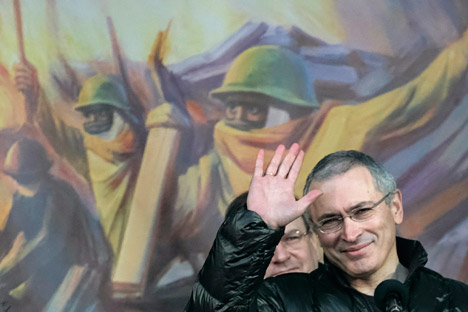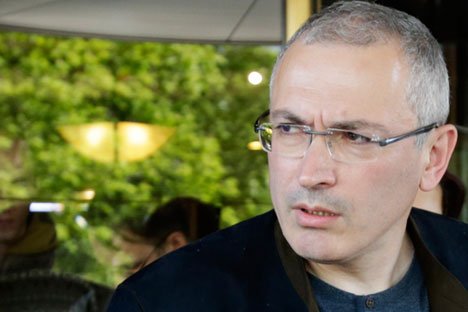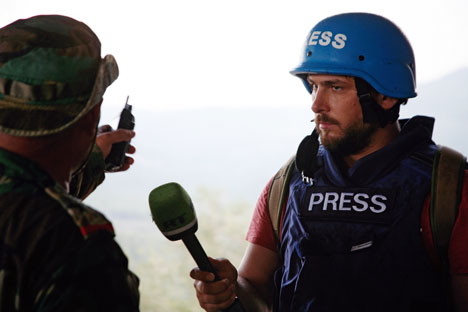Can Khodorkovsky help organize a revolution in Russia?

Former oligarch Mikhail Khodorkovsky.
ReutersRevolution in Russia is "inevitable," says oil baron-turned-dissident Mikhail Khodorkovsky, and this is the only way to change the government in the country. The former owner of the now-defunct Russian oil company Yukos said the only question is how to make a change of power in Russia "relatively peaceful."
Khodorkovsky made the statement on Dec. 9 from London during a conference call with the Moscow office of his Open Russia organization, just a day after Russian authorities launched a criminal case against him in absentia in connection with the murder of a Siberian official in 1998 and he was placed on a federal wanted list.
On Dec. 10 the Russian Prosecutor General's Office suspected Khodorkovsky of calling for the overthrow of constitutional order and sent a request to initiate criminal proceedings, and a day later the former Yukos head was charged in absentia with the organization of the murder of the mayor of the oil city of Nefteyugansk, as well as with the attempted murder of two individuals.
This is not the first time Khodorkovsky has been the subject of a criminal investigation. The oligarch was arrested in 2003 on charges of fraud in a case widely seen as trumped-up – Khodorkovsky had challenged Russian President Vladimir Putin over corruption – and Yukos, at the time one of Russia’s biggest and most successful companies, was controversially broken up by the state. Khodorkovsky was sentenced to nine years in prison in May 2005.
In late 2013, in the run-up to the Sochi Winter Olympics, Putin unexpectedly pardoned Khodorkovsky, who subsequently left the country and has since been based mainly in Switzerland.
After his release Khodorkovsky said in an interview with journalists in Berlin that he would not get involved in politics but would concentrate on human rights activities. However, Russian commentators say that while currently he has no plans to return to Russia, the idea that the exiled oligarch is renouncing politics is no longer relevant.
In fact, Khodorkovsky has made no attempt to conceal his political ambitions. Just one year ago he expressed his readiness to head the government or the country if he finds support or "if this is necessary to overcome the crisis."
Hands now untied
Many political analysts are of the opinion that Khodorkovsky’s release from jail must have been conditional on him agreeing to certain terms with the Kremlin, which may have included a pledge to stay out of politics. However, the details of any “gentleman’s agreement” that may have been concluded between Khodorkovsky and the Kremlin prior to or after his release remain a mystery.
"No word has more meanings than politics and no epithet is more ambiguous than political," said Yekaterina Schulman, a political analyst and professor at the Russian Presidential Academy of National Economy and Public Administration.
Some interpret Khodorkovsky's words to mean that he would not run for president himself, some think he will finance political parties, while others believe he will highlight socially vital issues and support the mass media. The most important thing about his statement, say analysts, is that Khodorkovsky no longer sees himself as bound to the Russian government by certain responsibilities.
"He is offended by being invited to the questioning as a defendant, his hands are now untied and he will do everything he thinks is necessary," said Schulman, adding that everything else, including talk about an upcoming revolution, is a verbal way of attracting attention.
A revolution is not created by the will of one or a few people, he explained: There first needs to be a demand for this in society and the country must have certain conditions for this to happen.
According to opposition politician and deputy chairman of the PARNAS people's freedom party Ilya Yashin, Khodorkovsky's latest statement increases the risks for his supporters in Russia and it will be very difficult to work in such conditions.
"But on the other hand, who has it easy now?" said Yashin, who believes that as long as Putin is president, Khodorkovsky will not be able to return to Russia – though the former Yukos head still has levers of influence.
"He has enormous life experience, intellectual potential, supporters and an organization in Russia that carries out many educational and electoral projects," said Yashin.
Outside the system
Yet according to Pavel Salin, director of the Center for Political Studies at the Russian State Financial University, Khodorkovsky’s criminal record and the current criminal case destroy any electoral prospects – the former oil baron cannot run for office.
While Khodorkovsky’s polished internet image is proof that he has good PR experts working for him, there are problems with his influence on political processes, says Salin.
“The agenda that Khodorkovsky is trying to promote with his resources and through his like-minded associates (an independent court, the annulment of ‘repressive laws’ and the release of political prisoners) does not interest many people at the moment. Today the most important issues are social programs and the economy.”
In any case, argues Stanislav Belkovsky, director of the independent Institute of National Strategy, a person living outside Russia cannot seriously influence the current political system.
"If in a few years he is able to accumulate a significant share of political and moral authority, then when the government changes, something that will not be a result of his efforts, there could be a demand for him in Russia. But realistically today he cannot be a leader," said Belkovsky, since in the two years that have passed since his release certain aspects of his personality have "faded."
"It’s one thing when a person is in jail and is simultaneously a political prisoner and a martyr, it’s another when he resides in Switzerland and the UK."
All rights reserved by Rossiyskaya Gazeta.
Subscribe
to our newsletter!
Get the week's best stories straight to your inbox

